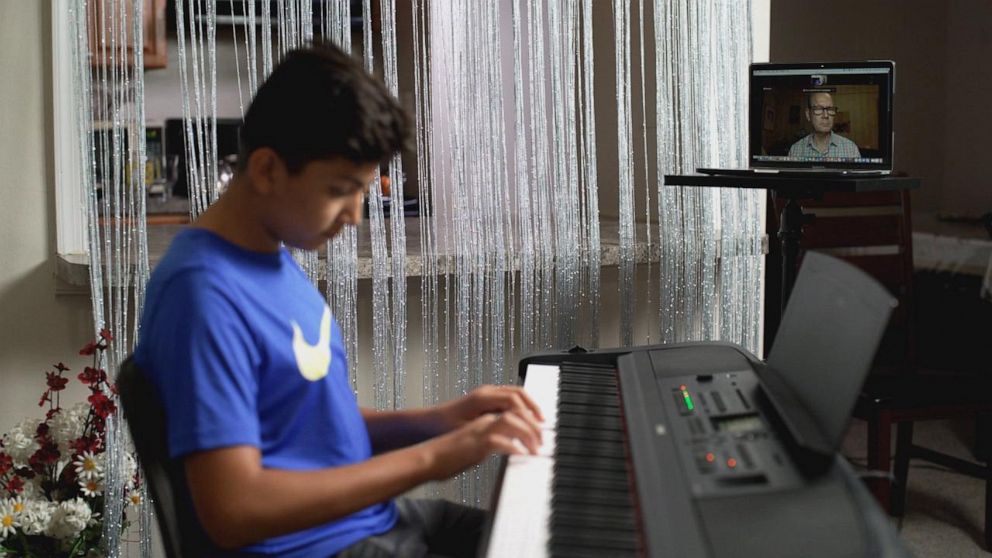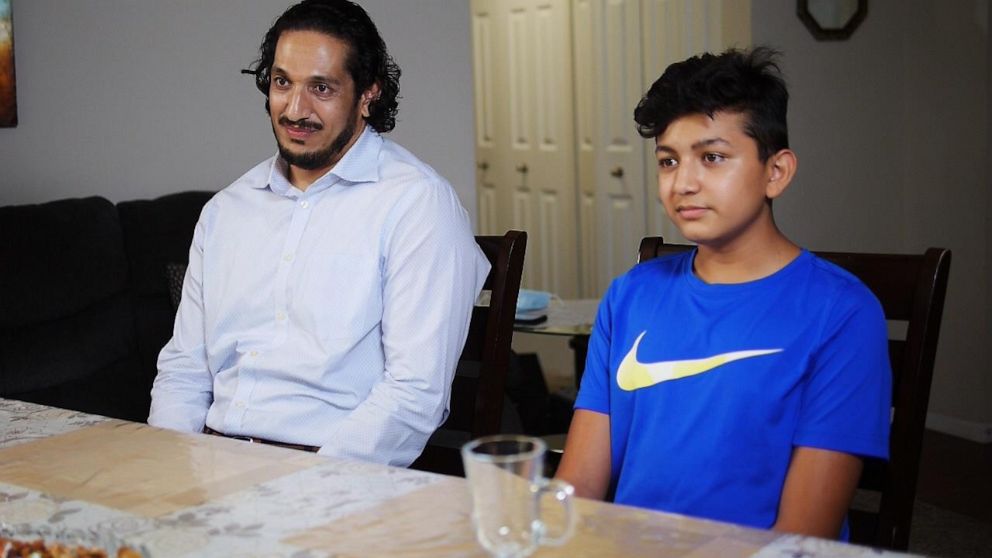America Strong: Composer gives free music lessons to Afghan teen struggling with PTSD
The teen's love for music has become the compass for his healing.
Just three days before his first day of high school, Mustafa Aria made a harrowing escape from Afghanistan after he and his family were trapped in Kabul for several days when the Taliban seized the capital city.
The 13-year-old Afghan American, who migrated to the United States with his immediate family in 2017 and lives in Virginia, was with his parents and three siblings in Afghanistan in late August to visit their relatives when turmoil in the war-torn country took a turn for the worst. The family fled with just the clothes on their backs.
Mustafa, an aspiring musician, left everything behind including his harmonium, the first instrument he learned how to play. He had brought it with him to Afghanistan, but because the Taliban is known for banning music, he did not want to put his family's lives at risk. The last time the militant group ruled the country, in the 1990s, playing musical instruments was strictly forbidden.
"I was pretty scared," Mustafa told ABC News' Kenneth Moton in an interview that aired Tuesday night on ABC News Live Prime. "What I was doing was just trying to hide my instrument from one place to another place. I was moving it, but finally, I just left it somewhere. And I'm pretty sure my family in Afghanistan right now is doing the same thing."

He said the journey out of the country was shocking and hard to forget.
"We made four attempts to get to the airport, and three of them weren't successful," he added. "We slept in the car and the next day, we found a way inside the airport. When I saw the U.S. soldiers, I felt I was safe."
Mustafa's father, Dr. Wais Aria, a humanitarian worker who has provided aid and rehabilitation services to Afghan child soldiers and women, said his kids were forced to watch him being beaten by Taliban fighters.
"I experienced a lot of traumatic events, like emotional and physical torturing," Wais told ABC News. "The children were witnesses of them beating me, and my daughter screamed. I do not talk to them about it because I don't want to make them more emotional."
To help the Aria family cope and work through their trauma, their friend Dr. Judy Kuriansky, a clinical psychologist and United Nations NGO representative, bought Mustafa an electric piano.
“When Wais and I were talking, he was telling me about the tremendous trauma that the entire family is in," Kuriansky told ABC News. "All the children are affected. The daughter is not talking and Mustafa was in shock. I asked what could give them some tiny bit of pleasure, and Wais said Mustafa was missing his keyboard that he had to leave in Afghanistan. I said, 'That's it. Go to the mall right now, pack the kids in the car and go buy a piano.'"

Kuriansky was concerned that Mustafa, as the oldest of four children, felt pressure to be strong for his family, which could impact his ability to process his emotions at such a difficult time.
"Teenagers who are traumatized can feel ashamed of their feelings. They suffer from what I call the three S's: shame, silence about how they're feeling and terrible stigma," Kuriansky explained. "And then the depression sets it."
So she connected Mustafa with New York composer Russell Daisey, in hopes that music lessons could provide a safe space as well as temporary relief from the debilitating post-traumatic stress.
"My heart was saying to me, this boy needed music," Daisey told ABC News. "He needed a form of expression. He loved music so much from his past."
Daisey said he asked Mustafa about his experiences and that the teen explained how he "didn't feel comfortable toward the end of [his] time in Afghanistan this past summer."
"He wasn't comfortable singing because it basically marked him. It marked him as someone who could be, as we all know, visited with hostility," Daisey said.
Now, through the music lessons, which Daisey is providing free of charge, Mustafa has found a compass for his healing.
"When I am kind of like depressed and stuff, when I play music, I focus to not mess up," Mustafa told ABC News. "I forget everything else and that kind of helps me in a way."
The teen said he's holding out hope that he can one day return to the home country he once knew.
"The music I play belongs to Afghanistan," he noted. "So I really want to go back there and play music because lots of people want me to play. That's my dream."




